Wisdom
The "integration of the negative" rather than insisting that God values perfection or an idealized morality, Francis of Assisi intuited, through the example of Jesus’ life and death, that God could be found in all things, even those our religion and culture urge us to reject. Therapists call this pattern of admitting our shortcomings and failures “embracing our shadow.” Such surrendering of superiority, or even a need for superiority, is central to any authentic enlightenment. The Beatitudes are all about incorporating what seems like disorder (a negative), which promotes a much better and different level of consciousness. (Rohr)
Faith and godly wisdom are viewed as co- occurring and in harmony with each other. God is ultimately the source and focus of both and they can, and should, be used together in the decision-making process.
I am not my ideas and opinions, and if I allow myself to be captive to my current ideas and opinions, my horizons will be really limited. And in humility open my heart to wisdom beyond my own.(Rohr)
The opposite of faith isn't doubt, it is certainty.(p 200, Freeing Jesus)
Wisdom is the ability to use intuition, knowledge and experience to make sound judgments. So, intuition can be considered a component of wisdom. Wisdom harmonizes apparently contradictory factors. What reason dissects, wisdom gently brings together. (https://www.quora.com/Is-there-a-connection-between-intuition-and-wisdom)

Wisdom is not the result of mental effort. It cannot be gained through intellectual study. Even life experiences do not make us wise if we don’t process them humbly and consciously. The Wisdom lineage offers us a healthy middle place, trapped in neither of the two alternating mediocrities of knowing: all heart and little head (lacking rational, historical, or scientific grounding) or all head and little heart (lacking deep personal experience, subtlety, or authentic love). For a holistic and mature faith, we need both head and heart grounded in our physical and sensory body. (Rohr's email 2/16/20)
Wisdom is knowledge deepened by love. The wise person knows more deeply by way of love than by way of argument because the eye of the heart can see the truth of reality. Hence the wise person is one who knows and sees God shining through everything, even what seems ugly or despised. 9
Wisdom is about inner work and transformation. Wisdom isn’t knowing more; it’s knowing more deeply, with more of yourself. Wisdom is caught more than taught. (cac.org)
Wisdom isn’t something you get from a guru or a reward for performing certain actions, but about inner work and transformation. Wisdom isn’t knowing more; it’s knowing more deeply, with more of yourself.(Rohr)
Wisdom means to see the oneness of everything and to open your heart to the Mystery that lies beyond words.12,xvi
Wisdom is not knowing more, but knowing with more of you, knowing deeper, carving and digging your being. (Cynthia B)
Spiritual wisdom can be defined as the understanding and knowledge that comes from a deep connection to one's inner self and the divine. It is the ability to see beyond the material world and to understand the interconnectedness of all things.
Definition of Wisdom
1. Wisdom is the soundness of an action or decision with regard to the application of experience, knowledge, and good judgment.
2. Spiritual Wisdom is a philosophy in spiritual New Age wisdom is you are a spiritual being manifesting consciousness. If you accept an aspect of who you really are, you can live out your life in a state of unconditional abundance and health. Knowing this is knowledge. Applying it to your world is spiritual wisdom.
3. Wisdom is a virtue that isn't innate, but can only be acquired through experience. Anyone who is interested in trying new things and reflecting on the process has the ability to gain wisdom. By learning as much as you can, analyzing your experiences and putting your knowledge to the test, you can become a wiser person.0
Thru Symbolism and Metaphor:
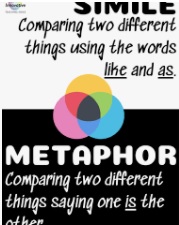
Metaphoral is more than literal. A metaphorical reading enables us to get at "the surplus of meaning that the text carries." Metaphorical meanings transcend, like Jesus being the parable/metaphor of God. (p196, Days of Awe and Wonder)
Eyes to see and ears to hear - “Listen up! Pay close attention!” Jesus’ simple request is that we use our God-given faculties (eyes to see, ears to hear) to tune in to His words and seek God’s wisdom concerning what’s written.
Whoever has will be given more, and they will have an abundance. Whoever does not have, even what they have will be taken from them” (Matthew 13:12) - Part of the judgment on those who refuse to believe is that they will eventually lose their opportunity to believe
In Christianity - The Tree of Life is mentioned in the Bible in the Book of Genesis. It is the tree that grows within the Garden of Eden and is the source of eternal life. There are several meanings behind the Tree of Life symbol in Christianity. Some believe it to be the symbol of humanity free from corruption and sin, while others believe it to represent love. The tree is believed to have healing properties and its fruit grants immortality.
In Buddhism - the Tree of Life is known as the Bhodi-tree and is believed to be the Tree of Enlightenment.
Espousal, marriage, or bride and groom to describe making us ever more ready for God. (Rohr,5/10/21)
When we get to the more mature stages of mystical union everything becomes a metaphor for the divine, and we grab for metaphors to make concrete the mystery that is now in everything and everywhere! “Our redeemer has become our bridegroom!” Mechthild exults. (Rohr,5/12/21)
The cross is a statement from God that reality has a cruciform pattern. See next. (Rohr,5/16/21)
Pyramid vs Circle: People are more comfortable with a divine monarch at the top of pyramidal reality. So we quickly made the one who described himself as “meek and humble of heart” (Matthew 11:29) into an imperial God. Circles are much more threatening than pyramids are, at least to empires, the wealthy, or any patriarchal system. What if we actually surrendered to the inner Trinitarian flow and let it be our primary teacher? Our notion of society, politics, and authority—which is still top-down and outside-in—would utterly change.(Rohr)
Sin requires redemption, a metaphor alluding to atonement, in which the death of Jesus is the price that is paid to release the faithful from the bondage of sin. In some forms of Christianity, it also requires reparation. (Wikipedia-Sin)
Rejected cornerstone - how we view human beings in society, that it is God’s intent that the stones that were once seen as unfit to be a part of the architecture—the stones that were once thrown away or kept in the quarry—have now been called to be the most important stones.(Rohr)
See Gospel of Thomas 18 - For where the beginning is, there will the end be.
See Paschal Mystery
Thru Paradox of God's Ways

Living with paradox can open us to experience the mystery of God. Many mystics speak of the God-experience as simultaneously falling into an abyss and being grounded. This sounds like a contradiction, but when we allow ourselves to fall into the abyss—into hiddenness, limitlessness, unknowability, we discover it’s somehow a rich, supportive, embracing spaciousness where we don’t have to ask (or answer) the questions of whether we’re right or wrong. The source of spiritual wisdom is to hold questions and contradictions patiently, much more than to find quick certitudes, to rush to closure or judgment as the ego and dualistic mind want to do. The ego wants to know it is right. This is why so much religion remains immature and is often a hiding place for people who want to be in control instead of people trained in giving up control to a Loving Presence. (Rohr)
Wisdom arises from living with paradox. Seeing and thinking paradoxically—grasping the truth of something that seems a contradiction. (Rohr)
For it is in giving that we receive. (St Francis of Assisi)
The cross was the price Jesus paid for living in a “mixed” world, which is both human and divine, simultaneously broken and utterly whole. In so doing, Jesus demonstrated that Reality is not meaningless and absurd, even if it isn’t always perfectly logical or consistent. Reality is filled with contradictions. (Rohr,5/16/21)
“For my thoughts are not your thoughts, neither are your ways my ways” declares the Lord. (Is 55:8)
Silence is not absence, but presence. It is a “something,” not a nothing. It has substantiality, heft, force. (Rohr,10/20/20)
After the earthquake a fire, but the Lord was not in the fire; and after the fire a still small voice.(1 Kings 19:12)
So the last shall be first, and the first last. (Matt 20:16)
We are saved, ironically, not by doing it right as much as by the suffering of having done it wrong. We come to God not through our perfection as much as through our imperfection.6,p22
The only perfection available to us is the ability to embrace the imperfect. Our failures open our hearts of stone and move our rigid mind space toward understanding and patience. It’s in doing it wrong, making mistakes, being rejected, and experiencing pain that we are led to total reliance upon God. (Rohr)
On the cross Jesus becomes the sin and the problem. He identifies with the wound, the pain, and the suffering (2 Cor 5:21). He does not stand apart from it but enters into it. What a paradox, what a mystery! (Rohr,9/14/20)
Authentic spirituality is not about getting, attaining, achieving, performing, or succeeding—all of which tend to pander to the ego. It is much more about letting go. That has severely limited our spiritual understanding—and Christianity’s power to transform culture. (Rohr,12/13/20)
In Buddhist thought there is wisdom in not-knowing. Not-knowing is being open to possibility, being alive with curiosity, living with the reality that we are not in charge and shouldn’t be. And the world is more wondrous because of it. (Post Std,11/17/20)
Jesus' truth is about right relationship and his proclamation of the power of powerlessness will save the world from self-destruction.(Rohr,11/19/20)
It sounds paradoxical: by excluding death from our life we cannot live a full life, and by admitting death into our life we enlarge and enrich [life]. (Rohr,5/18/21)
More analysis does not necessarily mean more wisdom, and having more options is not necessarily freedom. The accumulation of things is not likely to bring more happiness, and time saved is rarely used for contemplation. Religion at its best is always concerned with the depth and breadth, paradox and wonder of things. In this sense we have become an impatient and irreligious people.(Rohr)
We are both sinner and saint. These two seeming contradictions don’t cancel one another. Once the conflict has been overcome in you, you realize you are a living paradox and so is everyone else. Wrestle with the paradox. If we stay with him in the full struggle, we’ll realize that he eventually brings reconciliation on a higher level.(Rohr) See Nonduality incorporates the negative
The heart of the apostle Paul’s ministry as holding the paradox of suffering and new life, Christ’s crucifixion and resurrection, together. Paul’s metaphor of “labor pains” implies that suffering is woven into the process of creation from the very start, and it continues through the birth of the new creation.
We fail to live our own truth. We act contrary to our values and beliefs. We are hypocritical, lazy, lustful, and all the rest. But we are also trapped in the truth. As Jeremiah says, it burns within us (20:9). We know it’s the truth, even though we can never live up to it. Henceforward the only sin would be to deny that it is the truth. (Rohr)
Once we have learned the truth of love, we cannot believe the world of power is adequate or a correct response to reality. Grounding love is a love we can trust because we know it is not all up to us. We do not have to secure ourselves because we are radically secured—we are beloved children in a benevolent universe. One true love is all that is necessary. It tells us we do belong, we are connected, and we are at home. (Rohr)
Paul can talk in this paradoxical way about power and weakness because he meditated on the mystery of the cross. The one who was a failure became the redeemer. The one who looked naked and weak and like a loser became the ultimate winner. And so Paul sums it up in his beautiful philosophy, ending with the line, “It is when I am weak that I am strong” (2 Corinthians 12:10). "My grace is sufficient for you. Power is made perfect in weakness” (2 Corinthians 12:9). (Rohr)
We are exalted when we are humble:
We are made great by becoming small:
We are made free by becoming bondservants:
Happiness is Found when it is no longer sought:
Having nothing is possessing all things:
The prophetic path says there’s a way of moving toward winning that includes losing. It doesn’t exclude it. It’s what you’ve often heard me call perfection as the inclusion of imperfection. Sin is part of the journey towards salvation. The prophetic path talks about a journey of two steps forward that necessarily continues to include one step backward. That falling, that failing, that suffering—use whatever word—becomes the energy for the next two steps forward. It is the resolving of those immense contradictions that characterizes the mystics, the saints, the prophets, and all those who pray. The result is always a “third something.” (Rohr)
God goes out yet remains within; Gos is one yet three; is present within the universe yet distant from it; the universe reveals God yet at the same time veils him; we are gods yet shall die like men. (p73, The Way of Paradox)
See Reality's Paradox/Mystery of God's Way and see Christianity's Paschal Mystery
see Oneness - Paradox and
see Paradox
Thru Non-Duality as God's Way
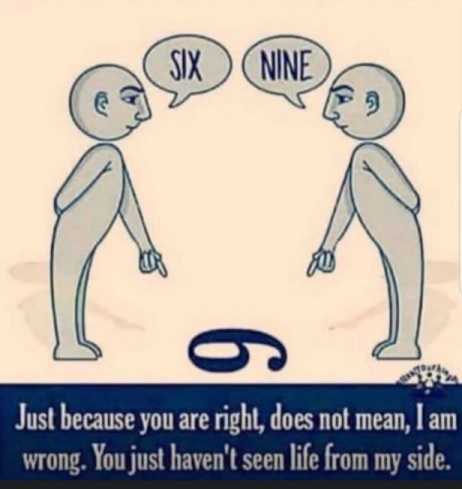
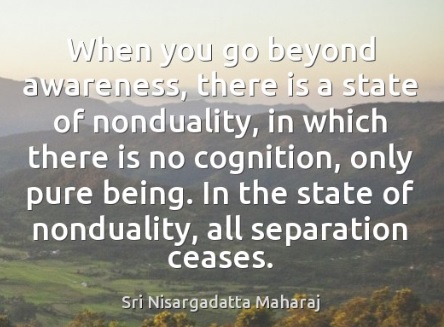
Creation, beautiful and enchanting as it is, is like a veil over the face of the naked presence of God. These two faces of God—veiled and unveiled—live in symbiotic unity, and out of that unity everything pours into existence in a cascade of sheer delight.(Rohr,10/20/20)
We must all overcome the illusion of separateness. It is the primary task of religion to communicate not worthiness but union, to reconnect people to their original identity “hidden with Christ in God” (Colossians 3:3). (Rohr,11/13/20)
The Kingdom of Heaven is really a metaphor for a state of consciousness; it is not a place you go to, but a place you come from. It is a whole new way of looking at the world, a transformed awareness that literally turns this world into a different place. . . The hallmark of this awareness is that it sees no separation—not between God and humans, not between humans and other humans. (Rohr,11/18/20)
“And” teaches us to say yes
“And” allows us to be both-and
“And” keeps us from either-or
“And” teaches us to be patient and long suffering
“And” is willing to wait for insight and integration
“And” keeps us from dualistic thinking
“And” does not divide the field of the moment
“And” helps us to live in the always imperfect now
“And” keeps us inclusive and compassionate toward everything
“And” insists that our action is also contemplative
“And” heals our racism, sexism, heterosexism, and classism
“And” allows us to critique both sides of things
“And” allows us to enjoy both sides of things
“And” is far beyond any one nation or political party
“And” helps us face and accept our own shadow side
“And” allows us to ask for forgiveness and to apologize
“And” is the mystery of the paradox in all things
“And” is the way of mercy
“And” makes daily, practical love possible
“And” does not trust love if it is not also justice
“And” does not trust justice if it is not also love
“And” is far beyond my religion versus your religion
“And” allows us to be both distinct and yet united
“And” is the very Mystery of Trinity(Rohr)
Humility, Truth, Happiness

People who follow this more humble and honest path are invariably more loving, joyful, and compassionate, and have plenty of time for simple gratitude about everything. (Rohr)
C S Lewis stated 'Humility is not thinking less of yourself, but thinking of yourself less.'
God resisteth the proud, but giveth grace unto the humble (James 4:6)
Because pride has wounded us, humility maketh us whole. (Augustine)
If something does not give birth to humility, and love, and dying to self, and godly simplicity, and silence—what can it be? (John of the Cross, The Ascent of Mount Carmel, book 2, chapter 29)
Staying humble to keep love alive - A humble person does not always have to prove their point, or be right or lead the conversation because they are truly comfortable with who they are and allows for better communication and trust to develop in a relationship. Humble individuals are more likely to admit their faults, apologize and practice forgiveness than an individual who is boastful or who is a narcissist. (PsychologyToday.com - How practicing humility can help your love life)
In the New Testament, humility is an openness to the neighbor, to a kind of communion or meeting of the souls with another human being in beneficent appreciation of the other’s dignity and beauty of personhood. (cct.biola.edu/dismantling-walls-humility-love-help-us-make-side - Dismantling Walls: How Humility and Love Help Us Make It to the Other Side)
Love is impossible without humility. If I want to excel at love, I first need to learn to be humble; to learn to count my own joy and pleasure as less important than the joy and pleasure of someone else. Perhaps the key to love is learning to derive pleasure from someone else’s pleasure. Selfless love is to find pleasure in another person’s pleasure. (www.challies.com/articles/love-humility - Love and Humility)
Psalm 25:9 says “The humble He guides in justice, and the humble He teaches His way.” If I approach God’s Word to humble myself before it, God will guide and teach me. If I approach His Word with pride and with a haughty spirit, God will oppose me, for “God resists the proud but gives grace to the humble.” (James 4:6)
The humble person is one who can continue to love someone who is cruel and mean, and still pray for their welfare, happiness, and protection, returning blessing for evil, rather than fighting back. When we submit to the Lord to obey Him, rather than following man’s wisdom or allowing our flesh to rule us, we will come out on top in the end. There is a reward for those who walk in love, humility and unity toward each other. They are the ones who inherit His blessings. The Lord has promised to bless those who walk in love with His welfare, happiness and protection. (www.revival.com/a/2479-the-humility-to-love-and-serve-others - The Humility to Love and Serve Others)
see Beginner's Mind in Faith's Humility and Dying to Self
You’ve got to admit, a big part of love is humility. It takes humility to be affectionate and to receive affection. If you want to fall in love and accept real love, you have to be humble enough to let go of your pride and receive that love. We have to humble ourselves to receive God’s love. Receiving salvation is a humbling experience. Those who humble themselves receive not only forgiveness, but also an infilling of love they could never have imagined. But those who are too proud miss out on both, for “God resists the proud, but gives grace to the humble” (James 4:6). (activated.org/en/relationships/from-the-heart/love/love-and-humility - Love and Humility)
Spiritual humility is the opposite of spiritual pride. It is recognizing our dependence. It is consciously giving to God his proper place at the center of all things and over all things, so that I see myself as his dependent creature, neither more nor less important than every other member of his human family. Love is humble, not proud, when it recognizes the equal worth of everyone and seeks to serve everyone. (www.woh.org/radio/love-is-humble - Love is Humble)
God, it seems, cannot really be known, but only related to. Or, as the mystics would assert, we know God by loving God, by trusting God, by placing our hope in God. (Richard Rohr's 1/29/20 email)
We see in the Sermon on the Mount that Jesus intended for us to take the low road. He intended us to operate from the position of “immoral” minority much more than the moral majority. When we’re protecting our self-image as moral, superior, or “saved” persons, we always lose the truth. As soon as people are comfortably enjoying the fruits of the established system, they don’t normally want any truth beyond their comfort zone. (Rohr,9/28/20)
In humility is the greatest freedom. As long as you have to defend the imaginary self that you think is important, you lose your peace of heart. (Rohr,11/24/20)
No one reaches the kingdom of heaven except by humility. (St Augustine)
We should search out what is wrong and what is lacking in ourselves. This is an excellent way of remaining humble. (St Vincent de Paul)
Be careful to give no credit to yourself for anything; if you do, you are stealing from God, to whom alone every good thing is die. (St Vicent de Paul)
Humility and wisdom are inseparable companions: "Where humility is, there also is wisdom." (Prov 11:2)
You can't experientially access this oneness. You're left unconsoled & inconsolable. So you're spun to the edge. And God leaves you there in order to deepen your radical dependency on God. Lastly, you realize you're being delicately wounded by Love. This love-wound is incurable except by the Love that's wounding you. (CAC Interior Castle week 7)
The Crucified God who fully accepts and transforms this tragic human situation through love. If this is the reality to which even God must submit, then surely we must and can do the same recognizing that we are all complicit in this mixed moral universe. This is perhaps the humility that Christians need in their campaigns for social reform. This is “carrying the cross” with Jesus. True healers are always wounded healers and not those who perfectly triumphed over all evil. Humans often end up doing evil by thinking we can and must eliminate all evil, instead of holding it, suffering it ourselves, and learning from it, as Jesus does on the cross (Rohr)
see Prayer of the Unknown Confederate Soldier
see Forgiveness from humble awareness of our humility
Have Acceptance / Surrender / Trust / Going with the Flow / Letting Go / Open

What you resist persists. Our first energy has to be “yes” energy. We don’t have to hate or condemn ourselves for a thought or feeling, but we do have to let it yield its wisdom. (Rohr)
Acceptance of our lower self / ego and its setup for failure. The truth will set you free. Trust and surrender to your Higher Self and remember the ego's job is to ensure your survival.
When the Higher Self works lovingly with the Lower Self, then the ego will eventually loosen its grip and learn to defer to the guidance of the Higher and thus merge as one.1
We will normally do anything to keep the old thing from falling apart, yet this is when we need patience and guidance, and the freedom to let go instead of tightening our controls and certitudes. Perhaps Jesus is describing just this phenomenon when he says, “It is a narrow gate and a hard road that leads to life, and only a few find it” (Matthew 7:14). Change happens, but transformation is always a process of letting go, living in the confusing, shadowy space for a while. The pain of something old falling apart—chaos—invites the soul to listen at a deeper level, and sometimes forces the soul to go to a new place. Most of us would never go to new places in any other way. (Rohr,7/5/20)
In all our actions, there is always a space left incomplete, imperfect, which God alone can fill. The search for “the perfect” often keeps us from “the good.” The demand for one single issue about which we can be totally right actually keeps us from reading the whole picture.(Rohr,11/3/20)
To allow what God for some reason allows—and uses: the imperfect everything, including me! (Rohr,11/6/20)
There is no mention of any moral worthiness, achievement, or preparedness in Mary, only humble trust and surrender. If we ourselves try to “manage” God or manufacture our own worthiness by any performance principle whatsoever, we will never give birth to the Christ, but only more of ourselves. We can’t manage, maneuver, or manipulate spiritual energy. It is a matter of letting go and receiving what is given freely. It is the gradual emptying of our attachment to our small “separate” self so that there is room for new conception and new birth. There must be some displacement before there can be any new “replacement”! Whenever the material and the spiritual coincide, there is the Christ. Henceforth, the Christ “comes again” whenever we are able to see the spiritual and the material coexisting, in any moment, in any event, and in any person. All matter reveals Spirit, and Spirit needs matter to “show itself”! (Rohr,12/6/20)
The great task of religion is to keep us fully awake, alert, and conscious. Staying awake comes not from willpower but from a wholehearted surrender to the moment—as it is. To be truly conscious, we must step back from our compulsive identification with our isolated selves. This may be the most difficult “letting go” of all, for the idea of our individual “selves” is the primary illusion of our lives. (Rohr,12/16/20)
We are in Heaven now by falling, by letting go, and by trusting and surrendering to this deeper, broader, and better reality that is already available to us. We’re in Hell now by wrapping ourselves around our hurts, by over-identifying with and attaching ourselves to our fears, so much so that they become our very identity. two-thirds of the teaching of Jesus is, in one form or another, about forgiveness. Forgiveness is simply the religious word for letting go. Eventually, it feels like forgiving Reality Itself for being what it is.(Rohr,12/18/20)
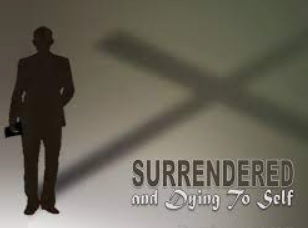
Dying to ourselves — to our own illusions, pretenses, narcissism, and self-defeating behaviors. (Rohr,4/2/21)
The way in which a person accepts their fate and all the suffering it entails, the way in which they take up their cross, gives them ample opportunity to add a deeper meaning to their life. (Rohr,5/18/21)
The so-called “little ones” (Matthew 18:6) or the “poor in spirit” (Matthew 5:3), as Jesus calls them, are the only teachable and “growable” ones according to him. Powerlessness seems to be God’s starting place, as in Twelve-Step programs. Until we admit that “we are powerless,” Real Power will not be recognized, accepted, or even sought. (Rohr)
After authentic conversion, you know that your life is not about you; you are about life! You’re an instance in this agony and ecstasy of God that is already happening inside you, and all you can do is say yes to it. (Rohr)
To participate in the reign of God, we have to stop weighing, measuring, and deserving in order to let the flow of forgiveness and love flow through us. You cannot move around inside the world of Infinite Grace and Mercy, and at the same time be counting and measuring with your overly defensive and finite little mind.(Rohr)
Surrender is the strongest, most subversive thing you can do in this world. It takes strength to admit you are weak, bravery to show you are vulnerable, courage to ask for help. It’s also not a one-time gig; you don’t just do it once and move on. It’s a way of existing, a balancing act. You're a part of a bigger flow, a bigger system and you are not doing it, it is being done unto you. Step out of your own way and let the natural order take the lead. (Rohr)
The idea of the mystery of God as love, for our surrender to God is based on God’s surrender to us. the surrender of God in love is the greatest act of humility, and one can only receive this love in poverty and humility. Receptivity marks the person of surrender. Francis and Clare lost and let go of all fear of suffering; all need for power, prestige, and possessions; and all need for their small self to be important. The false self does not surrender without a fight to its death. If suffering is “whenever we are not in control” (my definition), then we can understand why some form of suffering is absolutely necessary to teach us how to live beyond the illusion of control and to give that control back to God.(Rohr)
Jesus said, “No sign will be given except the sign of Jonah.” (Matthew 12:39) This is indeed unsatisfying. For it is not a sign at all, but more an anti-sign. It demands that we release ourselves into the belly of darkness before we can know what is essential. It insists that the spiritual journey is more like giving up control than taking control. We get to the right shore by God’s grace more than right action on our part. Trust the time in the belly of the whale, how to stay there without needing to fix, to control, or even to fully understand it, and to wait until God spit them up on a new shore. It is called “liminal space,” and I believe all in-depth transformation takes place inside of liminal space. (Rohr)
All great spirituality is about letting go. Instead, we have made it to be about taking in, attaining, performing, winning, and succeeding. True spirituality echoes the paradox of life itself. It trains us in both detachment and attachment: detachment from the passing so we can attach to the substantial. But if we do not acquire good training in detachment, we may attach to the wrong things, especially our own self-image and its desire for security. (Rohr)
The ability to live well is the ability to live without so many certainties. We will have to develop a high tolerance for having so little control and so few bedrock assumptions. (Rohr)
Emptiness, Nonattachment (Detachment), and Simplicity

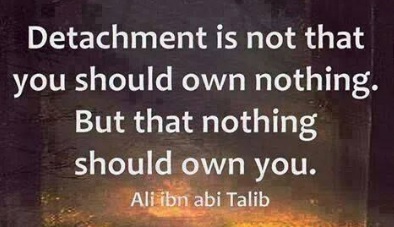
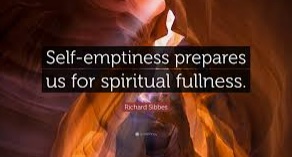
Ultimately, we can offer God no greater evidence of our faithfulness than by frequently detaching and turning from all things created so we can enjoy their Creator for a single moment. All this reverence must be done by faith, believing God is really living in our hearts, and we must honor, love, and serve them in spirit and in truth. we must turn back to God with complete confidence. Be still in the presence of divine majesty. Respect God humbly, telling them our heartaches and our weaknesses, and asking them lovingly for the help of their grace. This is how in our fragility we find in God our strength. (Rohr)
I have just three things to teach: simplicity, patience, compassion. —Lao Tzu
The key to simplifying life is to make sure love is your #1 priority. Love redirects our focus and unravels the complex, overextended lifestyle that keeps us ever running but never arriving. Through doing less because we love more. As you learn the practice of loving people, you will experience a shift from complex to simple, from hurried to peaceful, from “never enough time” to “time enough for those you love.” (Chip Ingram)
African proverb that a patient man has all the wealth in the world.
Live simply in a world that glorifies material possessions. If we have too many clothes in our closets, too much money in the bank, too many things cluttering our lives, God who will liberate and fill our emptiness with divine love. We will experience freedom and joy when we live with a loose grasp on material things. It is true that the best things in life are free, but we are often too distracted or too busy to see the simple treasures of life right in front of us. (Rohr, 7/1/20)
Desert spirituality is characterized by the pursuit of abundant simplicity—simplicity grounded in the possession of little—and the abundance of God’s presence. Detachment allows for greater direct experience of the Divine Presence as the seeker is attached to fewer distractions. And their false self were removed and a clearer understanding of their truest self emerged. It is this true self that dwells deeply with God.(Rohr,9/29/20)
Detachment brings suffering, but it differs from merely selfish, worldly suffering in that it is meaningful, it is leading us somewhere, and thus becomes easier to bear.11,p121
To empty the self is not an act of denial, but of fulfillment, for it creates space for God to fill one’s being. We are satisfied by nothing less than God. This is not a loss, but again, the greatest gain.(Rohr)
Emptiness, also called Nothingness, or Void, in mysticism and religion, a state of “pure consciousness” in which the mind has been emptied of all particular objects and images; also, the undifferentiated reality (a world without distinctions and multiplicity) or quality of reality that the emptied mind reflects or manifests.
Opposites become each other in the sense that differences disppear in emptiness. (p317, Zen and the Gospel of Thomas)
The ground of our being is this infinite generosity of God completely being given to us as this depth of ourselves. Therefore, the path has to be one of becoming detached from what hinders us from realizing it. (Rohr)
Detachment as the practice of letting go of everything that draws us away from God. Desert ascetics called this process of moving toward inner freedom detachment. Detachment allows for greater direct experience of the Divine Presence as the seeker is attached to fewer distractions. To cultivate purity of heart, we must be uncluttered in mind and heart and continue to be watchful and vigilant about those “seeping boundaries” where we can be deceived out of simplicity and into complexity under the guise of a “good.” (Rohr)
In whatever state we may find ourselves, whether in strength or in weakness, in joy or in sorrow, to whatever we may feel attached, we must renounce it. (Meister Eckhart, sermon on Luke 1:57)
F-E-A-R, Anxiety, and Anger
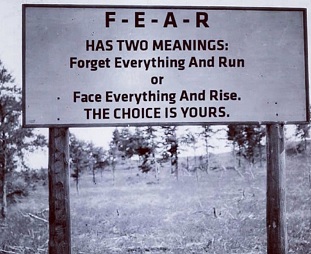
F-E-A-R has two meanings: 'Forget Everything And Run' or 'Face Everything And Rise'. The choice is yours. (a sign on Facebook, 6/30/20)
If we cannot calmly hold a certain degree of anxiety, we will always be looking for somewhere to expel it.6,p32
It’s been said that the opposite of love is not hate, but fear. Fear may protect us, but love releases us. It completes us. (Post Std, 9/6/20)
I John, your brother, who share with you in Jesus the tribulation and the kingdom and the patient endurance [of suffering]. (Rev 21:9)” This is the key understanding this letter from Patmos. (Rohr,4/30/21)
There is no fear in love. But perfect love drives out fear, because fear has to do with punishment. (1 John 4:18)
Maybe it’s not safety that keeps us from being afraid. Maybe it’s love. Maybe the opposite of fear isn’t bravery. Maybe the opposite of fear is love. So in the response to our own fears, in response to the very real dangers of this world we have an invitation as people of faith: which is to respond by loving.(Rohr)
“In your anger do not sin” : Do not let the sun go down while you are still angry.(Eph 4:26) Don't hold onto anger and don't let it motivate you because it easily leads to unwholesome talk and other sins. It gives the devil a foothold in your life.(Google)
Apocalypse, Uncover, Unveil, Awareness

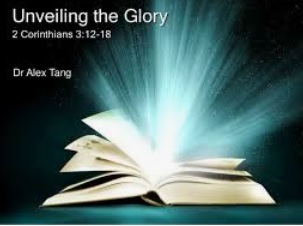
While we primarily use the word “apocalypse” to mean to destroy or threaten, in its original context, apocalypse simply meant to reveal something new. You cannot hold onto the old all the while declaring that you want something new. There is only one way to bring in the new. You must make room for it. Apocalyptic writing deconstructs the “taken-for-granted world” by presenting a completely different universe. (Rohr,4/25/21)
But whenever anyone turns to the Lord, the veil is taken away. And we all, who with unveiled faces contemplate the Lord’s glory, are being transformed into his image with ever-increasing glory, which comes from the Lord, who is the Spirit. (2 Cor 3:16,18)
Apocalypse is meant to shock, where what you used to call “normal” doesn’t apply anymore. "All this is only the beginning of the birthpangs. (Matt 24:8)" Apocalypse is for the sake of birth not death. Falling apart is for the sake of renewal, not punishment. An apocalyptic event reframes reality in a radical way by flipping our imagination. It’s not a threat. It’s an invitation to depth. It’s what it takes to wake people up to the real, to the lasting, to what matters. It presents the serious reader with a great “What if?” (Rohr,4/26/21)
When things are “unveiled,” we stop taking a whole lot of things for granted. It reframes reality in a radical way and offer us an invitation to greater depth and breadth—and compassion.(Rohr)
We will not be happy living selfishly in a small world. We must live in awareness and in association with the whole real world.(Rohr)
God hides in the depths and is not seen as long as we stay on the surface of anything. (Rohr)
Mystical / Intuitive Wisdom

On that day, you will know that you are in me and I am in you. (John 14:20) “That day” promised in John’s Gospel has been a long time in coming, yet it has been the enduring message of every great religion in history. Divine and thus universal union is still the core message and promise—the whole goal and the entire point of all religion.
Radical union is the recurring experience of the saints and mystics of all religions. We do not have to discover or prove it; we only have to retrieve what has been re-discovered—and enjoyed, again and again—by those who desire and seek God and love. When you think you have “discovered” it, you will be just like Jacob “when he awoke from his sleep” and shouted, “You were here all the time, and I never knew it!” (Genesis 28:16).(Rohr, 5/12/20)
The value of nonduality: a way of thinking, acting, reconciling, boundary-crossing, and bridge-building based on inner experience of God and God’s Spirit moving in the world. We’re not throwing out our rational mind, but we’re adding nondual, mystical, contemplative consciousness. When we have both, we’re able to see more broadly, deeply, wisely, and lovingly. We can collaborate on creative solutions to today’s injustices.
The Mystics honor the experience of the essential mystery and unknowability of God and invite us to do the same. The more you know, the more you know you don’t know!(Rohr,8/2/20)
See Knowing God Mystically / Intuitively
Intuition is God's whisper in the human heart, and therefore, what it reveals is always true. The Bible is full of examples of the value placed on wisdom and intuition. When asked what he wanted most, Solomon replied, "Give [me] an understanding heart to judge thy people, that I may discern between good and bad" (I Kings 3:9). Divine Intuition is a practical guide to help you learn how to access the rich wisdom available through the gift of your intuition.
The wisdom of the mystics is the healing of our souls. Mystic simply means one who has moved from mere belief or belonging systems about God to actual inner experience. We quite simply don’t have the power to follow any gospel ideal—such as loving others, forgiving enemies, living simply and nonviolently, or humble use of power—except in and through union with God. Nor do doctrines like the Trinity, the real presence of Christ in the Eucharist, salvation, or the mystery of incarnation have meaning that actually changes our lives. Without inner experience of the Divine, these are merely ideas. (Rohr)
The Wisdom Pattern (by Richard Rohr)

Order-disorder-reorder as the pattern of resilience and faith: Order by itself normally wants to eliminate any disorder and diversity. Disorder by itself closes us off from any primal union, meaning, and eventually even sanity in both people and systems. Reorder, or transformation of people and systems, happens when order and disorder are understood to work together. The unitive way (Reorder) is utterly mysterious. If we are not trained in a trust of mystery and some degree of tolerance for ambiguity and suffering, we will not proceed very far on the spiritual journey. (Rohr)
We are indeed 'saved' by knowing and surrendering to this universal pattern of reality. Knowing the full wisdom pattern allows us to let go of our first order, trust the disorder, and sometimes even hardest of all - to trust the new reorder. 6,pxv
Three big leaps of faith for all of us, and each of a different character. Father Richard Rohr illuminates the way understanding and embracing this pattern can give us hope in difficult times and the courage to push through messiness and even great chaos to find a new way of being in the world.
Order, by itself, normally wants to eliminate any disorder or diversity, creating a narrow and cognitive rigidity in both people and systems. Disorder, by itself, closes us off from any primal union, meaning, and eventually even sanity in both people and systems. Reorder, or transformation of people and systems, which happens when both are seen to work together. (Rohr,8/23/20)
ORDER - People do need some degree of order, predictability, security, and authority in order to function well. 6,p117
Most of us do not see things as they are; we see things as we are. Human kind cannot bear very much reality.6,p141
We become the God we worship. We can pretty much assess what a person is like and sense what their God is like.6,p142When God always has to come in our preferred form, then we are in charge, and God is no longer God, or a very snall part.?,p145We have been UNWILLING TO SEE THE DIVINE IMAGE IN THOSE WE JUDGE TO BE INFERIOR OR UNWORTHY.6,p149
Religion is the safest place to hide from God! In its healthy forms it is also the place to find God.6,p166At the time of the 2nd Vatican Council, Catholics were very self-confident. Numbers, vocations, money, and influence were positive and growing.6,p51
DISORDER - If we’re not willing to let go of our smaller selves, our norms, beliefs, and preferences, we won’t be able to enter the more expansive and inclusive space of Reorder. The invitation from Jesus to move from one stage to another seems quite clear in his frequent invitation to metanoia: to turn around or change our minds. The remaking of the soul and the refreshing of the eye has to be done again and again. (Rohr,8/16/20)
We all come to wisdom at the major price of both our innocence and our control. Few of us go there willingly; it must normally be thrust upon us. However, we must be wary of staying in Disorder for too long. We only become enlightened as the ego dies to its pretenses, and we begin to be led by soul and Spirit. (Rohr,8/21/20)
Without some deconstruction everything becomes idolatrous. The cross itself is clearly a proclamation of disorder at the heart of reality. True Christianity never believed in either perfect order or total chaos, but a reality fraught with contradictions.6,p13
We endure the pain of Disorder until we find the courage and grace to enter Reorder. In all our various creative labors—childbirth, making a living, raising a family, building a nation—there are moments that are so painful, we want to give up. But inside searing pain and encroaching numbness, we might also find the depths of our courage, hear our deepest wisdom, and transition to the other side. (Rohr,8/25/20)
Pure light blinds. Only the mixture of darkness and light allows us to see.6,p183
Stay in the 'dark night' until we have learned something essential. All transformation takes place in such liminal space.6,p186
REORDER - To arrive there, we must endure, learn from, and include the Disorder stage, transcending the first naïve Order—but also still including it! (Rohr,8/23/20)
Deep wisdom (voice,intuition) resides within each of us. Listening to our deepest wisdom requires disciplined practice. The most vigilant spiritual practice is finding the seconds of solitude to get quiet enough to hear the Wisdom within.(Rohr,8/25/20)
The Third Way, neither fight nor flight, but the way of compassionate knowing. Wisdom is always holding the "rational" and the "romantic" together. When the two can happily coexist within us, one might say that we are "saved."6,p16-18
See Reality - The Mystery of God and Evil and Suffering
Four Fold Ways/Paths:

The 4 Noble Truths -
inquiry, trial, understanding/wisdom, practice of wisdom gained9,p8 see Quadratos
Gospel of Thomas sayings:
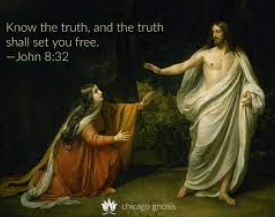
Overview: Gnosis is not intellectual knowledge, but that which is personal, like "I know that person, or do you know so and so." So this gnosis is self-knowledge; you could call it insight. It's a question of knowing who you really are, not at the ordinary level of your name and your social class or your position. But knowing yourself at a deep level. The secret of gnosis is that when you know yourself at that level you will also come to know God, because you will discover that the divine is within you.
Prologue: These are the hidden words which the living Jesus spoke, and which Didymus Judas Thomas wrote down. Commentary...
1: Whoever discovers the interpretation of these sayings Commentary...
1b: will not taste death. Commentary...
2: Jesus says: “The one who seeks should not cease seeking until he finds Commentary...
2b: and when he finds, he will be dismayed. Commentary...
2c: And when he is dismayed he will be astonished Commentary...
2d: and having astonished he will reign and having reigned he will rest Commentary...
3: Rather, the kingdom is inside of you and outside of you. Commentary...
3b: Once you come to know yourselves, you will become known. And you will know that it is you who are the children of the living father. Commentary...
4: The man aged in days will not hesitate to ask a little child of seven days about the place of life, and he shall live Commentary...
4b: The first shall be last and last first Commentary...
5: Recognize what is within your sight, and that which is hidden from you will be disclosed to you. Commentary...
6: His disciples asked him and said to him, "Do you want us to fast? How should we pray? Should we give to charity? What diet should we observe?" Jesus said, "Don't lie, and don't do what you hate, because all things are disclosed before heaven. After all, there is nothing hidden that will not be revealed, and there is nothing covered up that will remain undisclosed."Commentary...
7: Blessed is the lion which the man eats, and the lion will become man; and cursed is the man whom the lion eats, and the lion will become man. Commentary...
8,21,63,65,96 - Eyes to see and ears to hear Commentary...
11: On the day when you were one you became two. But when you become two, what will you do? Commentary...
12: When you depart from us, who is it who will be great over us? Jesus said: go to James the Just. Commentary...
13: Jesus spoke to him three words. Thomas said to them: If I tell you one of the words which he said to me, you will take up stones (and) throw them at me. Commentary...
14: If you fast, you will put a sin to your charge; and if you pray, you will be condemned; and if you give alms, you will do harm to your inner spirits. Commentary...
18: Since you have discovered the beginning, why do you seek the end? Commentary...
22: make two one, inside as outside, upper as lower, make male and female as a single oneCommentary...
23,4,11,16,22,49,75,106: single one. Commentary...
27: If you do not abstain from the world, you will not find the kingdom. If you do not make the Sabbath into a Sabbath, you will not see the Father. Commentary...
29: I am amazed at how this great wealth (spirit) has come to dwell in poverty (flesh). Commentary...
30: Where there are three gods, they are gods; where there are two or one, I am with him. Commentary...
35: It is not possible for anyone to go into the strong man's house (and) take it by force, unless he binds his hands; then will he plunder his house. Commentary...
41: He who has in his hand, to him shall be given; and he who has not, from him shall be taken even the little that he has. Commentary...
42: Jesus said: Be passersby. Commentary...
62: It is to those who are worthy of my mysteries that I tell my mysteries. What your right hand does, let not your left hand know what it does.Commentary...
70: If you bring forth what is within you, what you bring forth will save you. If you do not bring forth what is within you, what you do not bring forth will destroy you. Commentary...
82: Jesus said, "Whoever is near me is near the fire, and whoever is far from me is far from the (Father's) kingdom." Commentary...
96: Yeast in flour made large loaf of bread Commentary...
97: Got home and found the jar empty Commentary...
106: When you make the two one you will become sons of man. Commentary...
108: He who will drink from my mouth will become like me. Commentary...
113: The Kingdom of God is already present for those who understand the secret/hidden message of Jesus Commentary...
114: For every woman who makes herself male will enter into the kingdom of heaven. Commentary...
References: 1=Hidden Gospel of Thomas, 2=www.earlychristianwritings.com, 3=pbs.org
see Metaphysical Interpretation of the Gospel of Thomas
The Truth Shall Set You Free (John 8:32):

Jesus tells those who have begun to believe in him that if they hold to his teaching, they are really his disciples. Then they will know the truth. They believed that he was who he said he was. Their belief would be put into action by holding to his teaching and so being his disciples. Believing in Jesus’ work on the cross to redeem and save us must then lead to discipleship if we are to be “set free.” The truth will set you free from slavery to sin. The outcome of living the truth is always the right outcome, but there are always obstacles in the narrow path. These obstacles and overcoming them are part of what God uses to train us for freedom. (connectusfund.org)
Jesus is the Truth (John 14:6). Knowing the Truth will set one at liberty—free from sin, free from condemnation, and free from death (Romans 6:22; 8:1–2). Jesus came to proclaim liberty to the captives (Luke 4:18). “Live as people who are free, not using your freedom as a cover-up for evil, but living as servants of God” (1 Peter 2:16, ESV).
The soul does not see its fearful evil. When it perceives the truth, there comes to it a power which rouses it from its stupor, and strengthens it to break the fetters by which it has been bound. The doctrines of the true religion shall make you free - that is, it will free you from the slavery of evil passions, corrupt propensities, and grovelling views [and prejudices, mistakes, untruths, false notions, lust and passion]. The truth shall make you free; from ignorance and error, and the prejudices of education, under which the whole nation laboured, and from the thraldom of the [religious] law.(biblehub.com)
When we try to live up to the standards of a God that is purely light, and we can’t handle the darkness within us. And because we can’t handle it, we suppress it. But the more we suppress it, the more it leads its own life, because it’s not integrated. he makes it clear that this is not the perfection of suppressing the darkness, but the perfection of integrated wholeness. Jesus stresses the fact that God obviously allows the interplay of shadow and light. If God’s perfection allows for tensions to work themselves out, who are we to insist on a perfection in which all tensions are suppressed? God embraces you as you are—shadow and light, everything. God embraces it, by GRACE. And it has already happened. (Rohr,6/16/21)
We don't realize our freedom because we are unaware of the existence of this Ground of the Soul, and of how to get into it and act from within it.11,p119
I am the way, the truth, and the life. Except for my showing you the way of God you'd get lost. And with that, Jesus set on his path of suffering. (Freeing Jesus)
Randomness vs. God's Providence:
Randomness:

Many who say God allows evil and permits randomness say God voluntarily self-limits. God could intervene to prevent evil. God could stop a random event that will likely have negative consequences. But for some mysterious reason, this voluntarily self-limited God doesn’t momentarily become un-self-limited to prevent genuine evil. (thomasjayoord.com)
tbd
tbd
God's Providence:

Providence: divine guidance or care
Einstein famously claimed, “God doesn’t throw dice.” Some may find the view in which God utterly controls all the minutia of everyday life ()
“The lot is cast into the lap, but its every decision is from the LORD.” (Proverbs 16:33)
“I make wellbeing and create calamity, I am the Lord, who does all these things.” (Isaiah)
Both Randomness and God's Providence (Concurrence):

A tempered form of deism is recognizable in much of Christian philosophy today, which assumes God established the Laws of Nature at creation, but only very infrequently involves himself with their determined course. This position would align with the theistic evolution view of origins that is held by many in the Roman Catholic Church and recently popularized by Francis Collins’ “The Language of God.” Such a view minimizes God’s involvement with His creation, thus minimizing God’s responsibility for random events, and potentially opening the door for free agency of God’s creatures.(gcu.edu)
The Bible tells us that the randomness we see in the world about us is not without purpose and is within the plan and directives of God. The randomness we see can be reconciled with the doctrine of divine providence. This harmony is difficult to understand, but we should accept the biblical assurance.(gcu.edu)
Evolution: This extreme fine tuning for the initial conditions of the universe is taken by many as compelling evidence that behind the Laws of Nature is an intelligent designer. This view that God did create such a fined tuned universe and then stepped back from it to let it unfold (wind down) without His direct involvement. This position is known as deism. Such a view minimizes God’s involvement with His creation, thus minimizing God’s responsibility for random events, and potentially opening the door for free agency of God’s creatures. (gcu.edu)
It seems as if God has built something into the universe that manages randomness or that transforms randomness into orderliness. Can God have it both ways? God seems to use randomness at a lower level, and God seems to transform that at a higher level. Randomness can be highly purposeful – it’s an amazingly subtle way that God uses to manage the universe. (calvin.edu)
God has created a mechanism which generates randomness in accordance with certain probability distributions upon which He has decided. Most of the time He lets it operate without divine intervention. (gvsu.edu)